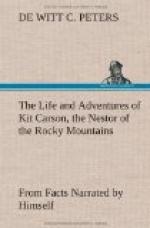Soon after the camp had been formed, they were visited by a Mexican man and boy; the one named Andreas Fuentes, the other Pablo Hernandez. They informed Fremont that they belonged to a party of Mexican traders which had come from New Mexico. They said that six of them, including in this number two women who acted as cooks, had been left by their friends in charge of a band of horses. The rest of the party were absent trafficking. The party of six thus left to watch the horses, consisted of Santiago Giacome, Andreas Fuentes and wife, and Pablo Hernandez, together with his father and mother. They were endeavoring to find better grazing for their animals. For this purpose they had penetrated the country as far as they dared; and, at about eighty miles from the camp of Fremont, had resolved to wait for their friends. Fuentes and the boy Pablo were on guard over the animals when their camp was attacked by hostile savages. The attacking band was about thirty in number.
Their principal object was to seize the horses. To effect this the more easily, they saluted the little band with a flight of arrows as they advanced. Fuentes and Pablo now heard Giacome warning them to start the horses and run for it. Both were mounted. They obeyed the directions of Giacome and with the entire band of horses charged boldly into the midst of the Indians regardless of their weapons. The charge succeeded in breaking their line, through which Fuentes and Pablo boldly dashed after their animals. The Indians deferred the chase to attend to a more bloody purpose. Having put sixty miles between them and the site of the attack, they left their horses and started in search of their main body. This search led them into Fremont’s camp. Fuentes feared that the worst had overtaken his wife. Pablo already looked upon himself as an orphan boy. He doubted not that the bloody savages had murdered both his father and mother. It was a sad picture to witness their grief. But Kit Carson could not do so unmoved. The heart of such grief has ever awakened his earnest sympathy. His sympathy, too, has never been of a wordy nature. He volunteered to go with Fuentes and make an attempt to deliver the captives, if such they should prove, or to avenge their death, if that became the sad alternative.
Fuentes had left the horses at a spring of water, well known to Carson. There he had found signs of white men which had led him into Fremont’s camp. There was no difficulty for Carson to find the spring. The whole company therefore traveled to the spring, which they reached early the next morning, distant about thirty miles from their last camp. The horses were not to be seen. A short examination of signs soon revealed to Carson and Godey that the two Mexicans had been followed by the Indians and that they had come upon the horses shortly after they had left them. Of course therefore they had captured and driven them off.




